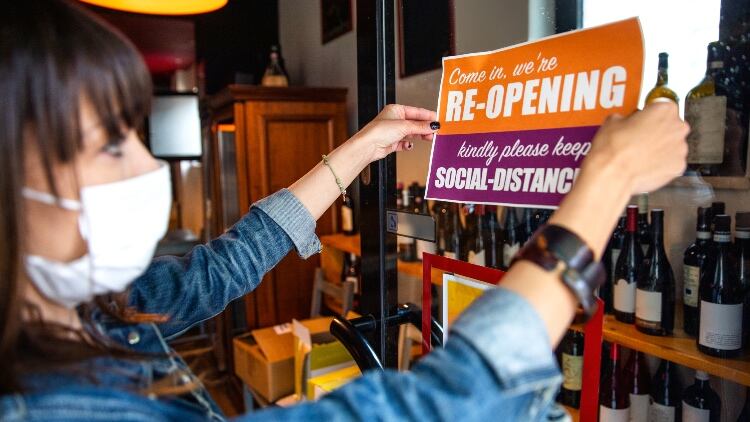Mask, or no mask? Check-in, or let customers come and go? Keep social distancing, or increase the number of covers?
These are just a few of the logistical challenges bar and pub bosses are currently mulling over after the Government first announced its intention to lift all restrictions on the 19 July.
However, with so-called ‘freedom day’ fast approaching, and amid mounting pressure to keep some restrictions in place, official Government guidance has now been published around ensuring a ‘Covid secure' working environment in sectors including hospitality.
There’ll no doubt be many staff members relieved by this, given polls showing those in retail and hospitality specifically are anxious about the lifting of restrictions.
Could new guidance ease anxieties?
The new guidance for pubs, bars, restaurants, cafés, nightclubs and takeaways recommends six ‘priority’ actions to take to protect staff and customers.
These include completing a health and safety risk assessment, providing adequate ventilation, cleaning more often, turning those with Covid-19 symptoms away from the venue, asking people to ‘check-in’, and communicating these measures to workers, visitors and contractors.
Buried a little further into the guidance are recommendations around face coverings, which have proved to be the true lightning rod in the debate around loosening restrictions.
Unions, staff and even many employers, baulked at the idea of removing the mandatory mask policy post-19 July; indeed, many organisations including Transport for London, Sainsbury’s, Tesco, Waitrose, John Lewis and Waterstones have already stated that they will continue to ask both customers and staff to wear masks.
The Government has maintained its position that face coverings will no longer be required by law come ‘freedom day’, though its latest guidance states it ‘expects and recommends that people continue to wear face coverings in crowded, enclosed spaces’.
Of course, face masks and the other priority measures will already be in place in any responsible venue. However, rather than being enforceable by law, come 19 July, it instead will be left to the discretion of business owners to abide by these recommendations.
If face covering policies do stay in place, they ought to also be mindful that some staff and customers will have mask exemptions and there are obligations under equality legislation to respect that, so as to avoid claims of discrimination, especially for hidden disabilities.
Keeping staff safe
Though some of these measures – particularly social distancing rules – have had a detrimental impact on the sector, there may well be reason to maintain them for worker and customer safety.
Many employees are understandably wary at the prospect of a complete lifting of restrictions, especially if they’ve spent recent months either on furlough or protected by Covid-safe workplace measures.
It’s clear there is a potential storm brewing between teams uncomfortable to return to the old way of working, and employers that are keen to get back to some sense of normality if not handled properly.
Set against the background of rising infection rates due to the Delta variant, it is vital for bosses to proceed with caution.
Following Covid secure risk assessments, they may decide based on the Government’s guidance to keep existing social distancing measures and face coverings in place for the time being at least.
However, irrespective of the toughened guidance, businesses still have existing obligations under the Health and Safety at Work Act 1974 to keep staff, customers, clients and contractors safe from all foreseeable risks – including the spread of diseases.
To disregard these obligations, perhaps emboldened by talk of ‘freedom day’, could prove reckless, potentially exposing businesses to claims from staff and members of the public alike.
Given this, it’s going to be important for employers to prove it has kept to Government guidance and has applied this carefully, to be well-placed to defend any claims potentially brought against it.
Could staff refuse to work?
Should staff still feel uncomfortable to return to the workplace even with safety measures in place, businesses will need to tread carefully, especially in relation to any medical-based concerns.
Should an employee have a disability under the Equality Act 2010, this affords protection against disability discrimination and means employers have a duty to make reasonable adjustments for their condition.
If an employee approaches HR to express their concerns or are reluctant or refuse to return to the workplace as a result of restrictions loosening, the best first step is a very open and honest conversation about these issues. People’s Covid fears and anxieties are valid and should be treated as such and addressed directly.
It could be as simple as talking through the measures in place to reassure people that every step has been taken to keep them safe or having a discussion around additional accommodations that would make them comfortable to return to the workplace.
Failure to address concerns, or even by simply appearing to have dismissed them, could well expose businesses to claims on discrimination grounds.
While many employment protections only come into effect after the first two years of employment, including unfair and constructive dismissal, this is not the case for discrimination claims – these can be sought no matter how long the member of staff in question has worked for the business.
Should these talks still lead to a stalemate, dismissal isn’t the only – or necessary – option, and could well inflame matters. By dismissing an employee for raising health and safety concerns or blowing the whistle in regard of these, this may amount to an automatic unfair dismissal. Like discrimination claims, there is no two-year service requirement that applies to bringing such claims.
This makes it all the more important to deal with concerns raised by staff sensitively.
Listen to and act upon any anxieties expressed, so as to avoid what may be exposure to substantive legal liabilities. With many businesses still feeling the financial burden of the pandemic, the last thing any hospitality owner wants right now is an unanticipated claim or tribunal case.




